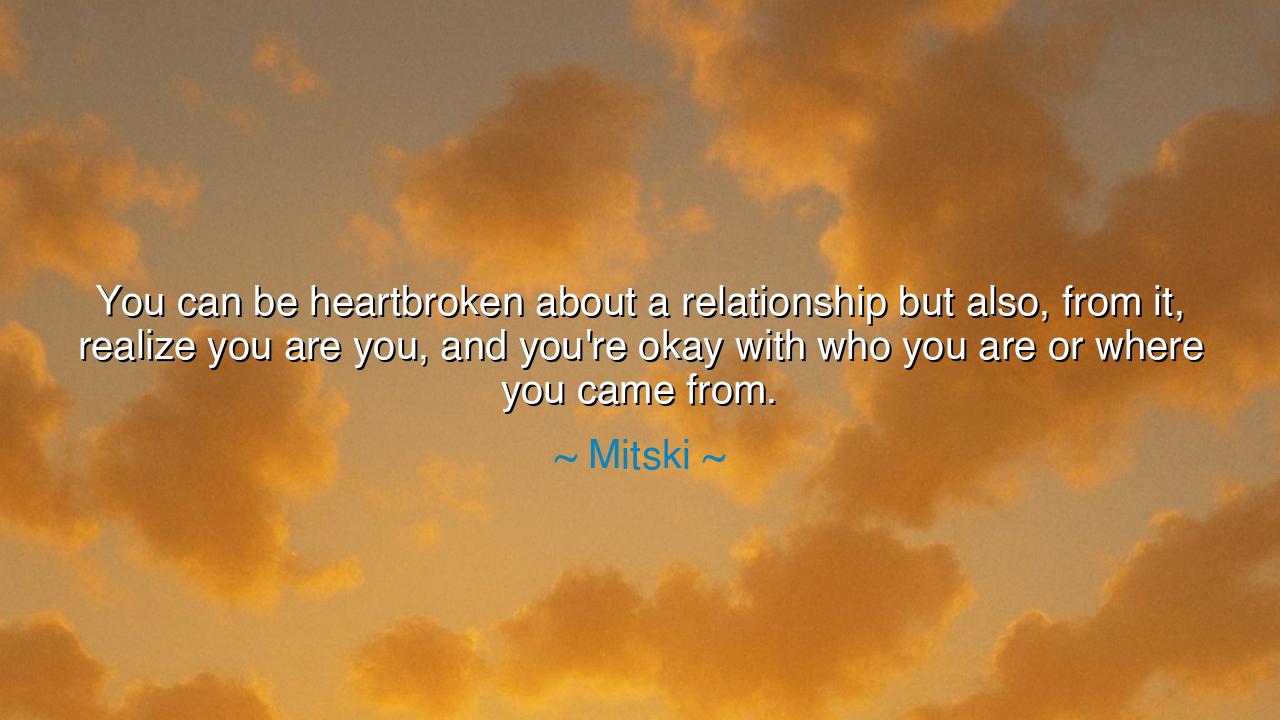
You can be heartbroken about a relationship but also, from it
You can be heartbroken about a relationship but also, from it, realize you are you, and you're okay with who you are or where you came from.






In the silent chambers of the heart, sorrow often walks hand in hand with revelation. Mitski speaks to this profound truth when she declares, “You can be heartbroken about a relationship but also, from it, realize you are you, and you’re okay with who you are or where you came from.” These words illuminate the paradox of human experience: that from loss and pain emerges the clarity of self, and that the trials of connection may reveal the enduring strength of the soul.
To endure heartbreak is to confront the depth of attachment and desire. Mitski teaches that such sorrow, while sharp and consuming, is also a mirror in which the self may be glimpsed. The ancients understood that suffering is a teacher; in the shadow of loss, the heart perceives its own resilience, its own values, and the truths that guide it beyond the fleeting flames of passion or disappointment.
From the ashes of a relationship, one may discover the profound gift of self-awareness. Mitski reminds us that to recognize “you are you” is to honor the essence of one’s spirit, independent of others’ acceptance or affection. In this, there is a liberation: a grounding in identity and origin that transcends the impermanence of connection, allowing the soul to walk forward with dignity and certainty.
The origin of this insight is as ancient as humanity itself. From the philosophers who reflected upon love and loss, to the poets who sang of sorrow and renewal, every tradition has recognized that personal understanding often blooms in the soil of heartbreak. Mitski’s modern reflection is a continuation of this timeless teaching: that through the trials of attachment, the self emerges stronger, clearer, and reconciled with its own journey.
Thus, let this teaching endure: embrace the pain of heartbreak not as a curse, but as a path to knowing that you are you. Find peace in being okay with yourself and your origin, for the lessons of love are not only in union, but in the discovery of the enduring self. In this understanding, loss becomes a guide, and the heart, though wounded, stands resilient and whole, ready to journey anew.






TPPhan The Phong
The way this quote expresses the duality of heartbreak — the pain mixed with the growth — really makes me reflect. But I’m curious: Can we ever fully accept ourselves if we’re still holding onto the past? Does the process of finding yourself require total emotional closure, or is it enough to embrace the parts of us that remain imperfect and unfinished?
NBNhung Be
I agree with the idea that heartbreak can lead to self-acceptance, but sometimes I feel like this process takes a long time. Do you think it’s always a linear journey? Can someone ever really feel completely okay with who they are after a heartbreak, or are we always evolving? I feel like sometimes it’s more about learning to live with the broken pieces rather than fully healing from them.
CATruong Chi An
Mitski’s words resonate deeply with me, especially the notion that we can come out of heartbreak with a renewed sense of self. It feels almost like a rite of passage, but what happens if we’re not okay with where we’ve come from? What if the past still weighs heavily on us? How do we reconcile those parts of ourselves with the version of us that has grown stronger in the process?
TVTran Thi Viet
This quote seems to touch on the idea that emotional pain can lead to a positive transformation. But I wonder, is it possible to truly appreciate who you are without going through something so difficult? Can self-discovery come from positive experiences alone? I’m curious to know if anyone feels like they’ve discovered their true selves in a different way, without the heartbreak component.
DNle thi dan nhien
It’s interesting how this quote highlights the bittersweet reality of growth after heartbreak. I’ve always believed that the pain of a breakup isn’t just about losing someone, but also about discovering more about yourself in the process. Do you think that the sense of self that comes from healing is stronger than the pain itself? Maybe it’s only after a loss that we fully understand who we are and where we stand in life.